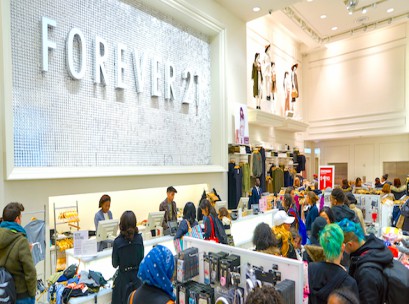
US fashion brand Forever 21 has filed for Chapter 11 bankruptcy protection and asked to close 178 locations across the US, as well as most of its stores across Asia and Europe, in an effort to return to profitability.
According to The Washington Post, the retailer will close 350 stores across 40 countries.
“Filing for bankruptcy protection is a deliberate and decisive step to put us on a successful track for the future,” the company said in a statement on its website.
“We are confident this is the right path for the long-term health of our business.
“Once we complete a reorganisation, Forever 21 will be a stronger, more viable company that is better positioned to prosper for years to come.”
Forever 21 entered Australia in 2014, but by 2017, it had closed all three of its local stores and exited the market.
GlobalData Retail managing director Neil Saunders said the bankruptcy would result in a much leaner business that would be more focused on key stores in core markets and online sales.
“The international operations will be much more significantly disrupted with most, if not all, stores in Europe expected to close,” Sanders said.
“In our opinion this is for the best, as Forever 21 was a weak player in a very competitive and sophisticated European apparel market; and it never really fully understood customer demand in the region.”
A consequence of changing tastes
Saunders stated more broadly that the bankruptcy was a consequence of changing trends and tastes within the apparel market, as well as missteps by management.
“Forever 21 was once a colossus on the fashion stage; it was a destination for young American shoppers looking for relatively cheap, on-trend clothing,” Saunders said.
“However, over the past five years the number of customers has waned as the brand has fallen increasingly out of favour. Part of this is down to the rise of credible competitors such as H&M, but some is also the result of a lack of clarity and differentiation.”
Saunders said that, in an era where it is increasingly easy to purchase goods online, the fast-fashion business has allowed its physical footprint to slide, and that resolving this should be a key part of its actions in the coming months.
Additionally, consumer trends away from fast-fashion and toward more sustainable models of consumption have impacted Forever 21’s relevance.
“Although this is not the main reason for the decline – as is witnessed by the success of other chains in the segment such as Primark – it has been broadly unhelpful to growth and has added further pressure to a business desperate to drive its sales line.”
Access exclusive analysis, locked news and reports with Inside Retail Weekly. Subscribe today and get our premium print publication delivered to your door every week.





